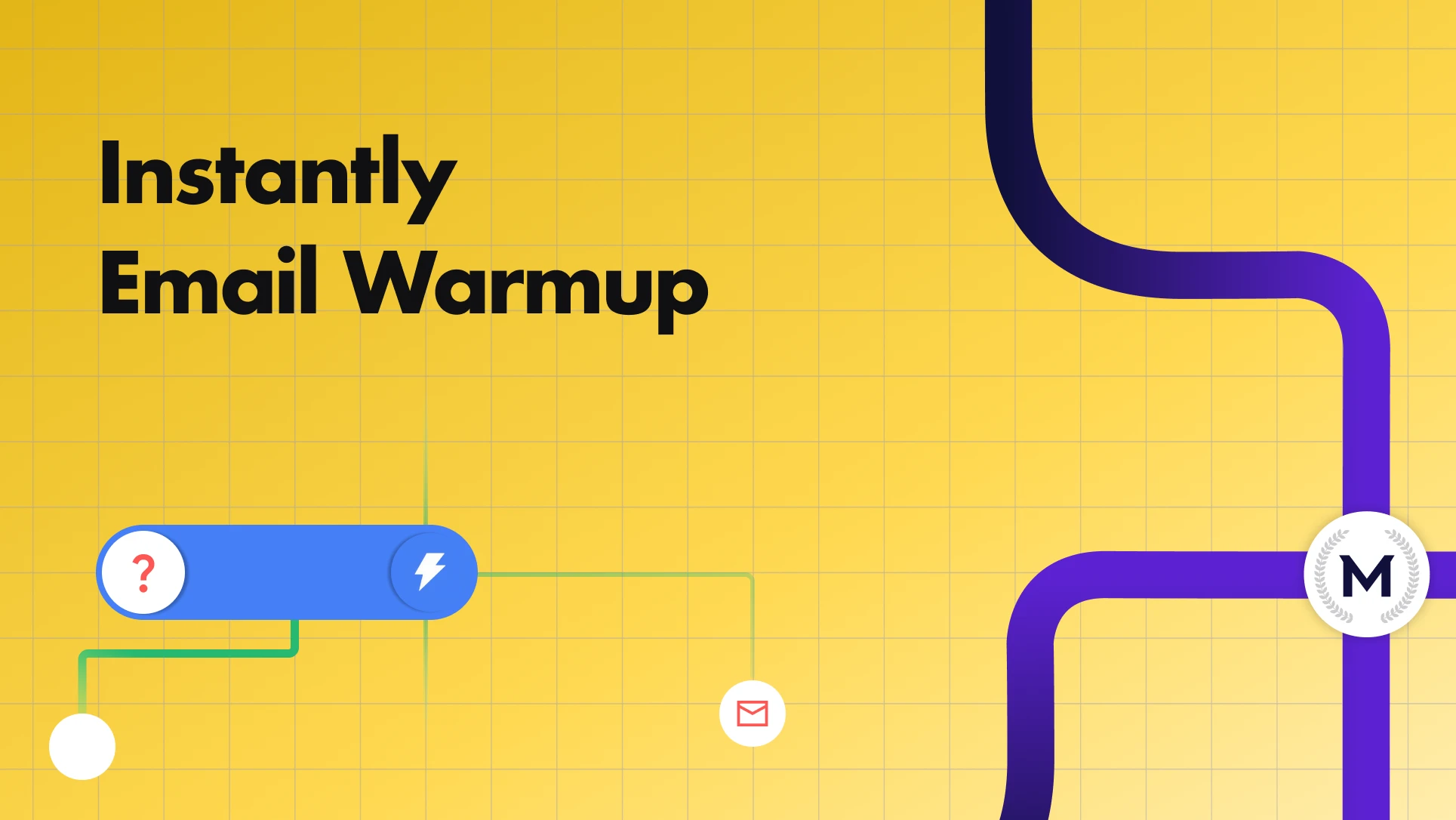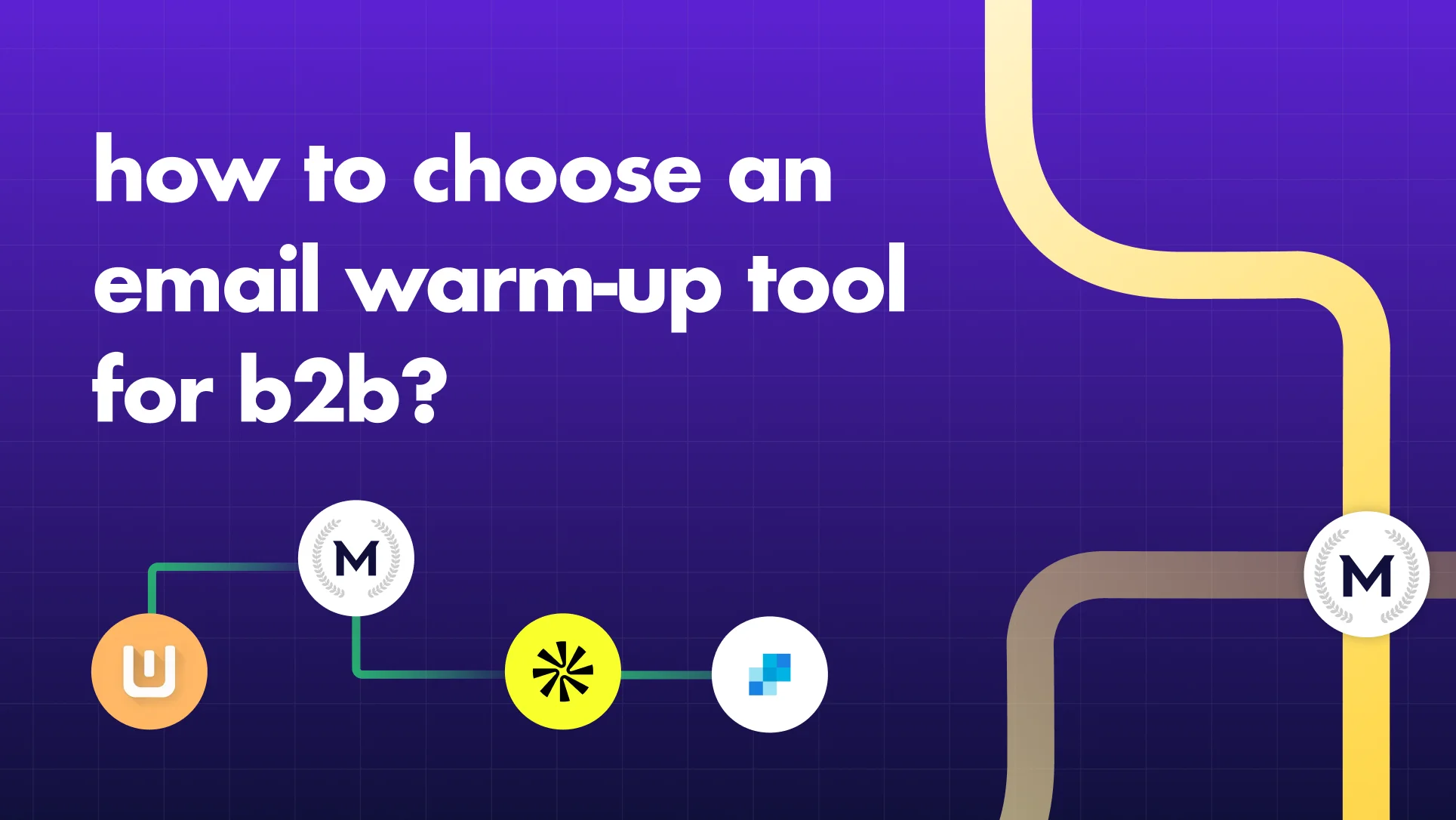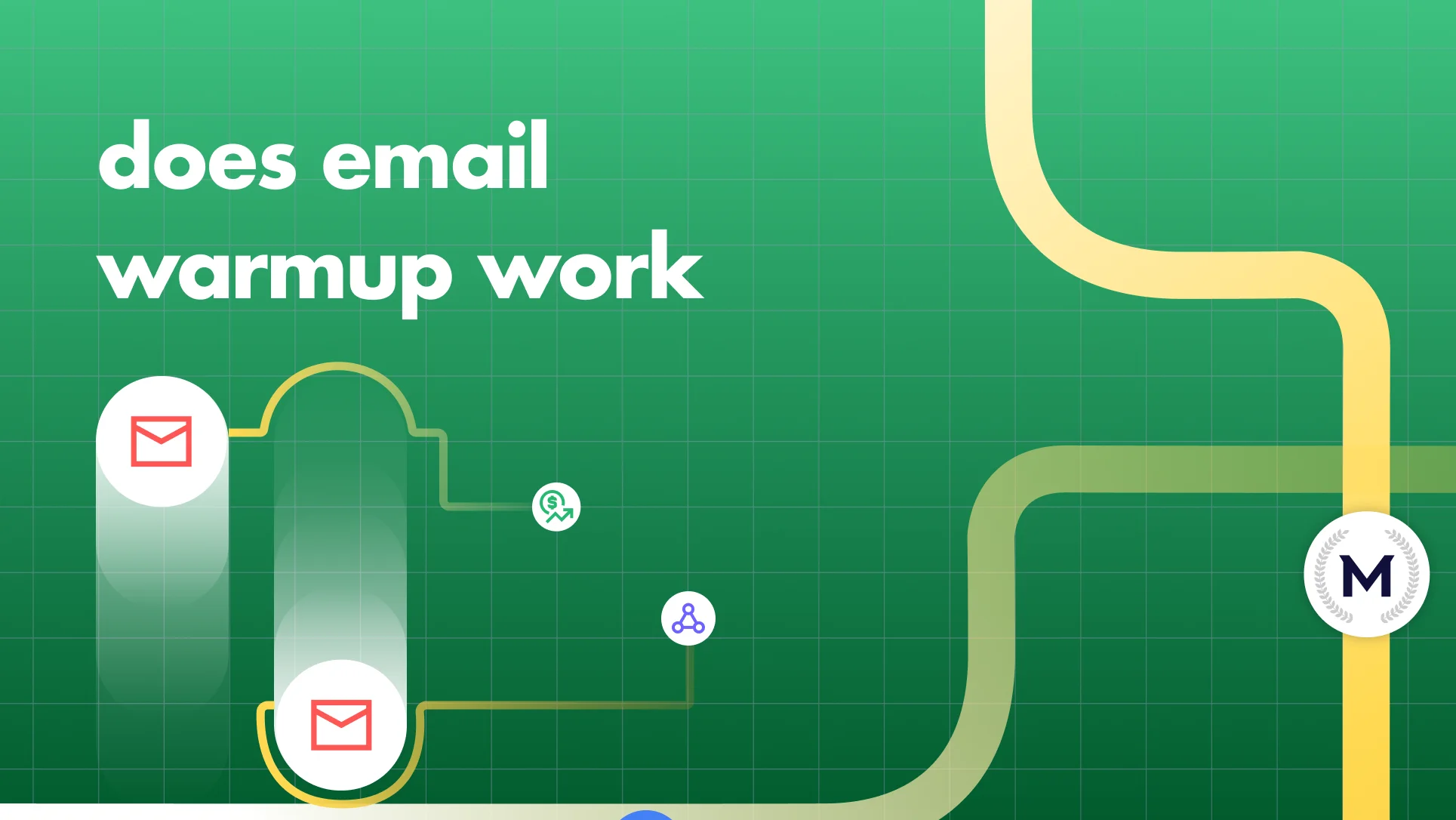If you're using Instantly Warmup and reply rates are dropping even with perfect email copy, you're not alone. Their ramp-up logic focuses on increasing send volume instead of simulating the nuanced, trust-building behaviors that Gmail or Outlook reward.
Even at modest daily caps, such as 30 to 40 warmup emails per inbox, the emphasis is still on reaching those numbers rather than creating quality interactions within a verified network. Without behavioral authenticity, mailbox providers can see patterns that look automated rather than organic.
This often leads to emails being flagged, ignored, or quietly deprioritized, while competitors using verified, behavior-based warmup networks are getting through and receiving replies.
Once your domain reputation slips, it can take more than six months to recover, if recovery is even possible. Most teams using Instantly AI warmup don't realize it’s happening until results have already tanked.
This review reveals exactly why Instantly's approach has fundamental flaws, how it compares to MailReach and other alternatives, and your step-by-step upgrade path without losing domain reputation.
But before we dive into the problems, let's establish exactly what Instantly's warmup feature promises and why those promises might be too good to be true.
What Instantly Gets Right and Why It’s Misleading
At first glance, Instantly Warmup looks like a no-brainer. It offers quick setup, configurable warmup limits, and full automation inside your existing sending platform. For agencies juggling multiple domains or growth teams that want speed, it can seem like a smart, streamlined choice.
The problem is that these same features encourage a focus on scaling send volume rather than building authentic, trust-driven engagement. That’s why many senders who start strong eventually find themselves landing in spam. Let’s unpack why.
1. Effortless setup, but no visibility
Getting started with Instantly is simple. Setup takes minutes, and everything runs in the background from a single dashboard.
The tradeoff is that you get no insight into who is interacting with your emails or whether those interactions matter to Gmail or Outlook. There is no transparency into the warmup network, no way to audit the quality of inboxes, and no ability to validate whether your domain is building real trust. It feels seamless, but it leaves you blind.
2. “Unlimited” Warmup, but from untrusted sources
Instantly’s warmup is included in your subscription, no matter how many inboxes you connect. That might seem like a cost saver compared to tools that charge per inbox.
But when you look closer, much of that activity comes from low-credibility sources like burner accounts, free inboxes, and custom SMTP relays. The problem is that Google and Microsoft only evaluate engagement from their own ecosystems, meaning Gmail users for Gmail and Outlook users for Outlook.
If your warmup network is heavy on custom SMTPs, those interactions do nothing to improve your trust with Gmail or Outlook. In some cases, they do not even help with inbox placement in other custom SMTP environments. This creates volume without building the trust signals that actually improve open and reply rates where it matters.
There is growing evidence of this problem. In one Reddit discussion, users shared how reply rates declined sharply even while warmup was running. The volume was there, but it didn’t help inbox placement.
3. Complete automation, but no deliverability intelligence
Instantly automatically adjusts volume and timing for you, which feels efficient when you are focused on building campaigns.
But if your emails start going to spam, you are stuck with general troubleshooting advice. There is no expert intervention, no inbox placement testing, and no way to isolate where the problem is. That means weeks or even months of underperformance while other senders solve the issue in days.
This is a serious risk. According to EmailToolTester, only 31 percent of emails reach the primary inbox without proper testing and optimization. If you are relying on automation without diagnostics, you are flying blind.
4. The illusion of free
Warmup that comes bundled with your outreach platform might feel like a good deal. But when poor deliverability causes you to lose even a few meetings, the revenue impact quickly outweighs the savings.
We explained this in more detail in our guide to avoiding spam, but the core idea is simple. If your domain reputation erodes while warmup is running, the long-term cost is far greater than the monthly price of a specialized warmup tool.
How Instantly Warmup Compares to Leading Alternatives
When your domain reputation determines whether campaigns succeed or fail, understanding these differences becomes the difference between sustainable growth and constant firefighting.
Instantly vs MailReach: Why Network Quality Trumps Volume
The first thing most users notice about Instantly's warmup is how quickly you can get started. Sign up, connect your domain, and you're warming within minutes. But this accessibility comes with hidden costs that become expensive problems at scale.
The network quality problem
Instantly's open-door policy allows people with poor sending practices, including heavy use of Custom SMTPs, into their warmup network. While this creates impressive volume numbers, it fundamentally compromises the quality of interactions your domain receives.
MailReach takes the opposite approach. Because it does not offer a free trial and is positioned at a higher price point, it attracts higher quality senders who typically use Google Workspace and Outlook or Office365. These are the email service providers that matter most for B2B outreach. The network quality is monitored continuously, and the conversation patterns mirror real business communication. This focus drives measurable results, such as the 67 percent average open rate and 19 percent revenue lift reported by MailReach users.
Automation without intelligence
Instantly automates everything,” reply timing, engagement pacing, templates, but it does it blindly. The platform doesn’t factor in sender type, audience timezone, or behavioral context. That creates robotic, one-size-fits-all engagement patterns that spam filters have already learned to detect.
MailReach’s email warmup engine mimics how real B2B conversations happen. It uses a time zone–aware scheduling, and seasonal context. That’s how it replicates human-like engagement, not just activity for activity’s sake.
Performance transparency that drives decisions
Unlike Instantly, which shows you numbers: “85% inbox placement,” bounce rates, spam flags, but none of that tells you what’s actually happening.
MailReach gives you a Reputation Score that accurately reflects your sender reputation with professional inboxes. You can see this score per ESP, including Gmail and Outlook, and identify exactly when and where performance starts slipping. MailReach also provides sender reputation trends over time, predictive alerts before deliverability drops, and real-time notifications when Gmail or Microsoft begins filtering you.
This granular visibility becomes crucial when managing multiple domains or client accounts, where different ESPs may respond differently to your sending patterns.
Instantly vs Lemwarm: Speed vs Foundation Building
At first glance, this feels like a straightforward tradeoff: move fast with Instantly, or build slowly with Lemwarm. But if you’ve ever lost a domain to Gmail’s filters or watched reply rates tank for no clear reason, you know the choice isn’t that simple.
It’s not just about speed; it’s about how your warmup strategy signals credibility to the inbox providers that matter most.
Instantly: Speed that works until it doesn’t
Instantly allows you to increase warm-up volume quickly by ramping up daily. A slow ramp might start with 2 emails on day one, then 4 on day two, then 6 on day three, and so on. For founders or growth marketers trying to hit campaign goals, that speed feels like momentum.
But to Gmail, that spike looks like spam.
Sudden volume increases, generic interactions, and unverified inbox activity raise flags and invite scrutiny. ESPs track engagement velocity, content patterns, and network behavior. Instantly’s warmup model ignores all of that. It pushes volume regardless of sender history or feedback signals. That’s how teams end up with 40–60% deliverability drops, not because of what they’re sending, but how they got there.
Lemwarm builds slowly but doesn’t flex
On the other end of the spectrum is Lemwarm. Their strategy is built around patience and protection. Warmup spans 3-4 weeks, mimicking the natural growth of a legitimate business sender. That pacing aligns with what Gmail and Outlook reward: slow, steady reputation-building over time.
For new domains or high-risk use cases, this approach works. It’s cautious by design and effective at keeping you out of trouble.
But if you’ve already built some domain trust or need to move faster for a product launch, Lemwarm’s rigidity becomes friction. It doesn’t adapt to your domain health, doesn’t consider your existing sender score, and doesn’t offer the flexibility to scale when conditions are safe.
Instantly vs Warmup Inbox: Why Both Miss The Mark
Instantly vs Warmup Inbox debate looks like a simple tradeoff between volume and control. Instantly offers immediate access, massive scale, and no approval process. Warmup Inbox takes a stricter approach by curating its network and verifying every participant.
But the real difference lies in how these models affect your domain's reputation once you join the network. That's where both approaches start to break down and where your deliverability rates actually suffer.
Instantly: Immediate Access
Its open network allows anyone to join, including free users, unverified senders, and inboxes set up on questionable email servers. This creates an enormous pool of interactions, which might look impressive on the surface. The problem is that mailbox providers already know how to identify these low-trust signals.. Your warmup volume increases, but your sender reputation remains flat or begins to degrade.
Warmup Inbox: Controls The Flow
Warmup Inbox takes the opposite route. It limits participation to established senders with proven credibility. This helps avoid the contamination problem and ensures interactions come from clean sources. But this rigid structure creates another issue.
When Warmup activity follows identical timing, volume, and engagement patterns week after week, spam filters start recognizing it as automated behavior. Mailbox providers like Gmail are specifically designed to spot repetitive patterns, even when they appear clean. As a result, the engagement may be safe, but it eventually stops contributing to your reputation.
What both platforms miss is the need for an adaptive, behavior-based warmup that mimics genuine human interaction. Neither reflects how modern inbox providers measure trust and credibility over time.
Do you know? Gmail’s spam filters use machine learning and rule-based systems (like SpamAssassin-style scoring) to identify repetitive or suspicious patterns.
MailReach: The Reliable Alternative
For serious senders and agencies managing multiple domains, MailReach offers the precision most warmup tools lack. Unlike Instantly’s open network or Lemwarm’s rigid timeline, MailReach gives you:
- A verified, high-reputation inbox network, no free accounts, no SMTP noise
- Context-aware, human-like interactions that mimic real business behavior
- ESP-specific analytics that tell you where you're being filtered and why
- Adaptive warmup logic that adjusts to your domain health in real-time
And because warmup is the major part of the deliverability equation, MailReach includes real inbox placement testing (via Spam Test) and built-in SPF and DKIM checkers, so you can diagnose issues before they snowball into reputation damage.
Not only that, operationally, MailReach helps with:
- Real-time alerts for deliverability and reputation changes
- Team collaboration
- Advanced reporting and white-label options for client deliverables
- API access for custom integrations with existing workflows
Everything is built around one goal: earning trust with Gmail and Outlook, not just hitting arbitrary volume targets. Because if your warmup tool isn’t helping you grow safely, it’s just a liability with a nice dashboard.
Protect your domain. Switch to MailReach before deliverability loss becomes revenue loss.
 Email Warmup
Email Warmup Instantly Warmup Review 2025: Why Reply Rates Drop and Best Alternative
Instantly Warmup Review 2025: Why Reply Rates Drop and Best Alternative









